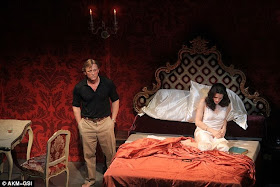There are “serious” theatre people, whether they admire
Harold Pinter or not, who will judge this play against some ideal of a Harold Pinter project. Are the pauses long enough? Are the sub-textual multiple levels of
Betrayal properly conveyed? Is it up to snuff. And then there are the visceral audience
members; those who desire to be entertained and moved by the story on
stage. For these audience members, Betrayal won’t fully explain
what all the fuss is about.
Betrayal
opens with a pair of ex-lovers, Emma and Jerry, meeting years after their
affair ended. Emma’s marriage to her
husband Robert has just ended, and she wants to warn Jerry that she has
admitted to their long term, but now long over affair. Emma knows it is important to warn him, since
Robert and Jerry have been friends since before Robert and Emma’s
marriage. For the Pinter-ites among us, this scene describes the triple
Betrayal immediately that plays out in the show. Emma has betrayed her husband for years. Jerry has betrayed his best friend for
years. And now Emma has betrayed the
unspoken trust of their mutual lie.
It is a superbly acted scene with Rachel Weisz as Emma and
Rafe Spall as Jerry. The two sit
isolated in a pub and their nervous familiarity defines the uncomfortableness
that comes with expired intimacy.
The play then moves to a meeting between Jerry and Robert,
an equally excellent Daniel Craig, where it is revealed that Emma actually told
Robert about the affair years ago. Jerry
now feels doubly a fool, first carrying on a clandestine affair that wasn’t
very clandestine and secondly believing a lie told by his ex-paramour with no
other reason than to make him look foolish to his friend. For the non-Pinter-ites among us, this reserved British embarrassment
is what drives the rest of the play.
 |
| Daniel Craig & Rachel Wiesz as the married couple at the heart of Betrayal |
The play runs in reverse chronological order, revealing how
the affair fell apart, how Robert found out about the affair and how the whole
thing started. It might be argued that
Emma was a pawn in a male dominance game between these two men, but Rachel
Weisz’ Emma is too strong a character for that.
If that was ever the motivation for either man, Emma had long since
coopted the power herself. But Ms. Weisz
doesn’t portray Emma as some emotionally powerful sex kitten. Quite the opposite, Rachel’s Emma is powerful
because she is emotional, open without being needy and loving without the
societal norms that most people have.
Daniel Craig’s Robert is a cuckold who isn’t defined by the
deception. Robert is a publisher that
doesn’t particularly like modern prose, an analogy for the husband who doesn’t
particularly like marriage. He is aloof
from his business and seemingly aloof from his wife’s infidelities. It is a difficult role to pull off without
being bitter, yet still capable of emotion.
Mr. Craig does an excellent job of it.
Robert obviously loved his wife and was great friends with Jerry. If he still is, or if it is just habit is hard
to read, as it should be. Mr. Craig
grace under pressure is wonderful – although that 1970’s hair is so dreadful as
to be distracting.
Rafe Spall is excellent as Jerry. Seemingly driving the action, he has an
oblivious loving wife and family (unseen), a beautiful lover and a best friend
/ business associate that knows nothing.
Jerry is living the playboy life.
As it unfolds that he has disappointed his lover and hasn’t been fooling
his best friend, his bearings are lost.
The bewildered result is well earned, as revealed through the play.
So there you have it.
For the Pinter-ites, we have an exquisitely acted treatise on the upper
classes’ sexual politics. For your
average theatergoer we have a very well acted, but ultimately dry play about
sexual betrayal that somehow doesn’t seem to register with these characters
emotionally. For most of us, it is a
curiously distant play on a subject that should be immediate.
Mike Nichols does an admirable job directing the show to
make it accessible to all. Many of the
long, lingering pauses and unsaid questions are handled speedily, without any
loss of meaning or ambivalence.
Betrayal is a speedy 90 minutes, leaving the audience questioning, as it
should.
-----
Betrayal
Playwright: Harold Pinter
Director: Mike Nichols
Cast: Daniel Craig, Rachel Weisz, Rafe Spall












